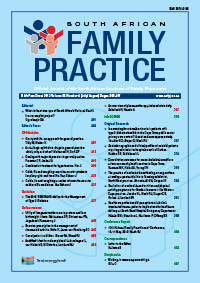The practice of exclusive breastfeeding among mothers attending a postnatal clinic in Tswaing subdistrict, North West province
Keywords:
Exclusive breastfeeding, Rural, PMTCT, Reported practice, South Africa
Abstract
Objectives: The aim of this study was to determine reported infant feeding practice with reference to exclusive breastfeeding, exclusive formula feeding and mixed feeding at six weeks postpartum among women attending a postnatal clinic in the Tswaing subdistrict of North West province, and the strength of the association between maternal human immunodeficiency virus (HIV) status and exclusive breastfeeding. Design: Three hundred and eighty-six randomly selected women from seven primary healthcare clinics in Tswaing subdistrict, who were in their sixth postnatal week between November 2009 and February 2010, were enrolled in this study. Data were collected using a researcher-formulated questionnaire to ascertain demographics, including HIV status, as well as reported infant feeding practice. Secondary analysis was carried out to determine the strength of the association between the HIV status of the subjects and exclusive breastfeeding. Setting and subjects: This study was conducted among women over the age of 18 years attending their first six weeks postnatal visit in seven primary healthcare clinics that provide postnatal care in the rural Tswaing subdistrict of the North West Province. Outcome measures: The self-reported infant feeding practice at six weeks postpartum, demographic determinants of reported infant feeding practice, and the strength of the association between maternal HIV status and reported infant feeding practice, particularly exclusive breastfeeding, constituted the main outcome measures. Results: Comparatively, more HIV-negative (n = 157), than HIV-positive women (n = 43), reported that they were breastfeeding exclusively and had received infant feeding counselling (n = 258 vs. n = 65, p-value < 0.05). Exposure to infant feeding counselling and a negative HIV status were associated with higher exclusive breastfeeding rates. Conclusion: HIV-positive women are still at risk of transmitting HIV to their nursing infants on account of suboptimal infant feeding methods in the prevention of mother-to-child transmission (PMTCT) context. This calls for further research in this area, and in the interim, more support to pregnant and nursing HIV-positive mothers, with a view to achieving the aims of the PMTCT programme.
Published
2013-01-15
Section
Original Research
By submitting manuscripts to SAFP, authors of original articles are assigning copyright to the South African Academy of Family Physicians. Copyright of review articles are assigned to the Publisher, Medpharm Publications (Pty) Ltd, unless otherwise specified. Authors may use their own work after publication without written permission, provided they acknowledge the original source. Individuals and academic institutions may freely copy and distribute articles published in SAFP for educational and research purposes without obtaining permission.

